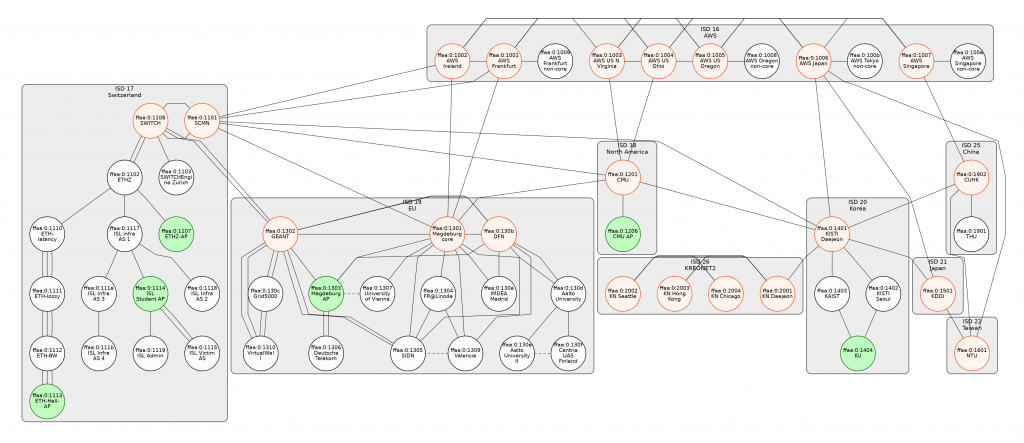A global network testbed
SCIONLab is a global research network to test and experiment with the SCION internet architecture. As part of the SCI-ED project, the SCIONLab infrastructure was much expanded. SCIONLab has the following goals:
- Novel experiments: SCIONLab enables researchers to actively participate in the SCION network and perform secure, fine-grained inter-domain route control, a property which cannot be achieved today by existing testbed platforms. This property is available as a built-in feature of SCION. The ASes created by the users of SCIONLab are first-class citizens, which participate actively in the SCIONLab routing infrastructure.
-
Allow organic growth: SCIONLab aims to enable organic growth of
SCION’s deployment by opening up the existing SCION infrastructure
to researchers. -
Low management overhead: SCIONLab is designed to require low
administration overhead. The aim is to enable research personnel in universities and institutions that adopt SCION to easily join and experiment with SCIONLab with a minimal amount of human intervention, through an easy-to-use web interface. -
Short- and long-lived research experiments: In addition to providing
easy setup, SCIONLab also aims to enable short-lived and long-lived
experiments, depending on the nature of the research. For instance,
SCIONLab allows a researcher to set up their own SCIONLab AS(es) on
her local premises, connect it to the SCION network, perform experiments and later disconnect. Alternatively, SCIONLab also allows a researcher at an institute to set up a group of SCION ASes in the institution’s data center, connect them to the SCION network, and be part of the network in the long term.
Participate in the network
As a participant of SCIONLab, a personal ASes can be created to actively participate in the SCION inter-domain routing. Such an AS will be running on user’s own hardware, under their full control.
The infrastructure of SCIONLab comprises a network of globally connected ASes. A number of SCIONLab ASes are configured to act as “Attachment Points”, and users can choose one as the uplink for their AS. The link between their AS and the attachment point AS is established as an overlay link over the legacy Internet.
A website serves to simplify and coordinate the setup of experimental ASes. Once created and configured in the SCIONLab website, users can download the configuration files for the SCION services and run their AS locally, with native packages or in a VM.
A simplified model
In order to simplify the management of ASes and lower the entry-barrier for participation, the design of SCIONLab deliberately has some restrictions that are not present in the production deployment of SCION:
- SCIONLab centralizes management of the control plane public key infrastructure. In the real deployment of SCION, there is no such single point of failure.
- Overlay links over the publicly routed Internet are used both in the infrastructure and between the infrastructure and user-owned ASes. Therefore, the security, availability, and performance properties of SCION are not fully realized.

References
Read more about the history, usage and use cases in this paper:




